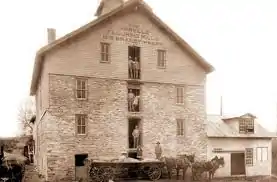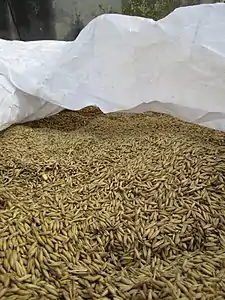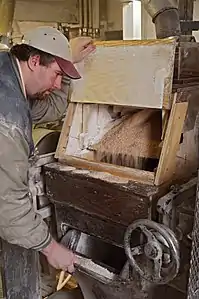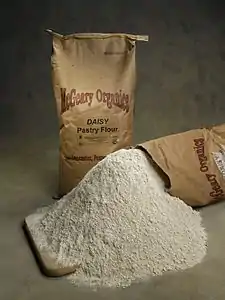
Annville Mill is thought to be one of the oldest continuously operating commercial flour mills in the United States,[1] according to the local historical group, the Friends of Old Annville.[2] A grist/flour mill has been standing since 1740 at this main street, now 545 W. Queen St, in Annville, Pennsylvania on the banks of Quittapahilla Creek, originally powered by water, but electrically powered since more than a century ago.[3]
First used to grind flour as a grist mill, it also functioned as a saw mill and a fulling mill[4] One of the first owners was Andrew Miller. The mill began a major process of modernization when purchased by the Brandt family in 1909, a time of great advances in milling technology in the United States.[5] During the 20th century, roller mills were designed to extract flour from wheat in a process that was more economical than the age-old grinding of grain between two stones. Today, wheat grains are run through two rollers of different sizes that operate at varying speeds. They are then pneumatically lifted and repeatedly sent through the rollers until fully processed. The resulting flour is sifted and bagged under the name of Daisy Organic Flour. During that century of ownership, the Brandt family converted the mill power from water power to electricity and from grist mill to roller mill. Bakeries favored the flour for pretzels and pie crusts as well as the cookies.[2] Bakeries have always favored the mill's original product – pastry flour[6] – for pretzels and pie crusts as well as cookies. Only pastry flour was produced by the mill during the 18th, 19th centuries because local farmers were only able to grow the varieties of soft wheat that are best suited to the climate in this area of the northeast United States. In 2002 Annville Flouring Mill was purchased by McGeary Organics in order to support the commitment of local farmers to growing organic grains. With access to national transportation systems, McGeary has been able to introduce hard-wheat[7] flours to the mill, adding Bread Flour[8] and All-Purpose Flour[9] to the product line of the Annville Mill. Annville Flouring Mill now produces premium Daisy Organic Flours from both regional and national growers of soft and hard wheat.[4] Spelt flour[10] was the last type of flour added to the product line of the Annville Flouring Mill. Spelt flour was first produced in the Annville Mill in 2002 in response to the rising popularity of ancient grains in the organic food world today.
Annville Mill Gallery
 Annville Mill on Quittapahilla Creek.
Annville Mill on Quittapahilla Creek. Organic Grain used to make Organic Flours.
Organic Grain used to make Organic Flours. Roll Stand in Roller Mill with mill worker.
Roll Stand in Roller Mill with mill worker. Bag of flour milled at the Annville Mill.
Bag of flour milled at the Annville Mill.
References
- ↑ Koenig, Debbie (30 August 2011). "Pennsylvania mill works to develop flour with a taste of history". The Washington Post. Retrieved 7 June 2013.
- 1 2 Bowman, Sue (October 25, 2008). "Annville Flour Mill Is Nation's Oldest in Operation". Lancaster Farming.
- ↑ Rhen, Brad (4 January 2011). "Annville Mill keeps on rollin'". Lebanon Daily News. Archived from the original on 23 October 2013.
- 1 2 "Annville Mill History". Daisy Flour. 12 March 2022. Archived from the original on 17 June 2010.
- ↑ Smith, Andrew. "Eating History. 30 Turning Points in the Making of American Cuisine". Columbia University Press. Retrieved August 5, 2013.
- ↑ Strickler, Roberta. "Organic Pastry Flour". Archived from the original on 15 November 2014. Retrieved 19 November 2013.
- ↑ Strickler, Roberta. "Flours 101 Hard vs Soft". Archived from the original on October 21, 2013. Retrieved November 12, 2013.
- ↑ Strickler, Roberta. "Nutrition Improves With Slow Rise Baking". Archived from the original on 6 November 2013. Retrieved 19 November 2013.
- ↑ Strickler, Roberta. "All Purpose Flour Says It All". Archived from the original on 21 October 2013. Retrieved 19 November 2013.
- ↑ Strickler, Robera. "Spelt Flour Makes A Comeback". Archived from the original on 16 November 2014. Retrieved 19 November 2013.